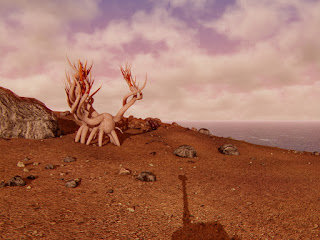Four years ago in planetary exploration
Tuesday, November 13, 2018
Comments: 1 (latest 1 day later)
Tagged: failed experiments, extrasolar, real-time if
The creator has written a brief postmortem.
If I had to name just one thing that prevented Extrasolar from being financially self-sufficient, I'd say this: We built an unmarketable experience. [...]
Once we got players through the front door, most were hooked. But every marketing campaign we tried fell flat. In a way, it's been comforting to hear fans tell me repeatedly — at festivals, through emails, and on our forums — "It's just too far ahead of its time."
(-- Rob Jagnow, Extrasolar Postmortem)
Let's run with that. If Extrasolar was ahead of its time in 2014, when is that time? Now?
In one sense, no. 2018 is a terrible time to launch an experimental, hard-to-explain indie game. (Or rather, it's a terrible time to spend significant money building one!) The market is full of highly-tuned experiences in comfortably familiar niches, or slight variations of those themes. Nobody has to search very hard to find a game they like. A few wild ideas will become unexpected hits, as they do every year, but the percentage of wild ideas that succeed has only slid lower since 2014.
But we do have a bit more vocabulary, and I don't think Extrasolar is as unpitchable as it was back then.
What is Extrasolar? It's real-time interactive fiction. We can say that because Lifeline introduced that genre in 2015. I don't mean Lifeline invented its gameplay mechanics de novo -- nothing does that -- but that was the big hit which spawned imitators and a category label. Extrasolar is graphical and exploratory, rather than branching and textual, but it shares Lifeline's rhythm: you make requests of a fictional distant partner and wait through a "realistic" delay for a reply.
Another obvious comparison is No Man's Sky, a game centered around procedural generation and rendering of alien worlds. Extrasolar doesn't offer infinite variety -- you explore one small island -- but the alien species are algorithmically generated. The characteristics of each plant, for example, are derived from the simulated environmental conditions of its location. (Sheltered or windy spots, sandy or rocky soil, and so on.)
The label "walking simulator" existed in 2014, but I'm not sure anyone used it to describe Extrasolar. It's not a bad fit, though. (Substitute "rolling" for "walking".) This is a game where the primary verb is Look At A Thing. If that doesn't advance the story, look closer or move on and look elsewhere.
And finally the label I started with: alternate reality game. That's easy to pick out. The game launched with an in-character web site (exoresearch.com) and an equally in-character opposition site (exoleaks.com, although that one doesn't seem to have survived). ARG-ish hacking and out-of-the-box exploration isn't the core of Extrasolar, but it's a nice frame which adds flavor to the experience.
So does that add up to a pitch? A walking simulator on wheels, as real-time IF, with procgen alien species and a ARG shell? Okay, that's trying too hard. My point is just that we have a larger ecosystem to compare Extrasolar to. Maybe the next wacky idea in this space will do better.
The post-mortem promises that when the game is taken down (December 1), it will be replaced by an archive that tells the story in static form. The creative work, the videos and emails that you received through the story arc, won't entirely disappear from the world. Good for him.


